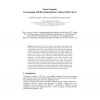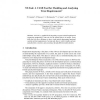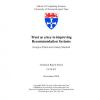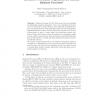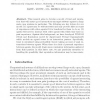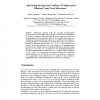ITRUST
2005
Springer
14 years 5 months ago
2005
Springer
Trading privacy for trust thanks to the linkage of pseudonyms has been proposed to mitigate the inherent conflict between trust and privacy. This necessitates fusionym, that is, th...
ITRUST
2005
Springer
14 years 5 months ago
2005
Springer
Abstract. When we model and analyze trust in organizations or information systems we have to take into account two different levels of analysis: social and individual. Social leve...
ITRUST
2005
Springer
14 years 5 months ago
2005
Springer
ST-Tool is a graphical tool integrating an agent-oriented requirements engineering methodology with tools for the formal analysis of models. Essentially, the tool allows designers ...
ITRUST
2005
Springer
14 years 5 months ago
2005
Springer
Trust is an important tool in human life, as it enables people to cope with the uncertainty caused by the free will of others. Uncertainty and uncontrollability are also issues in ...
ITRUST
2005
Springer
14 years 5 months ago
2005
Springer
The importance of risk in trust-based systems is well established. This paper presents a novel model of risk and decision-making based on economic theory. Use of the model is illus...
ITRUST
2005
Springer
14 years 5 months ago
2005
Springer
ITRUST
2005
Springer
14 years 5 months ago
2005
Springer
This paper devises a classification system for reputation systems based on two axes, namely: who performs the evaluation of a subject’s reputation, and how the information is col...
ITRUST
2005
Springer
14 years 5 months ago
2005
Springer
Business Processes for Web Services are the new paradigm for lightweight enterprise integration. They cross organizational boundaries, are provided by entities that see each other ...
ITRUST
2005
Springer
14 years 5 months ago
2005
Springer
Abstract. This research aims to develop a model of trust and reputation that will ensure good interactions amongst software agents in large scale open systems in particular. The fo...
ITRUST
2005
Springer
14 years 5 months ago
2005
Springer
Collaborative Filtering (CF), the prevalent recommendation approach, has been successfully used to identify users that can be characterized as “similar” according to their logg...
